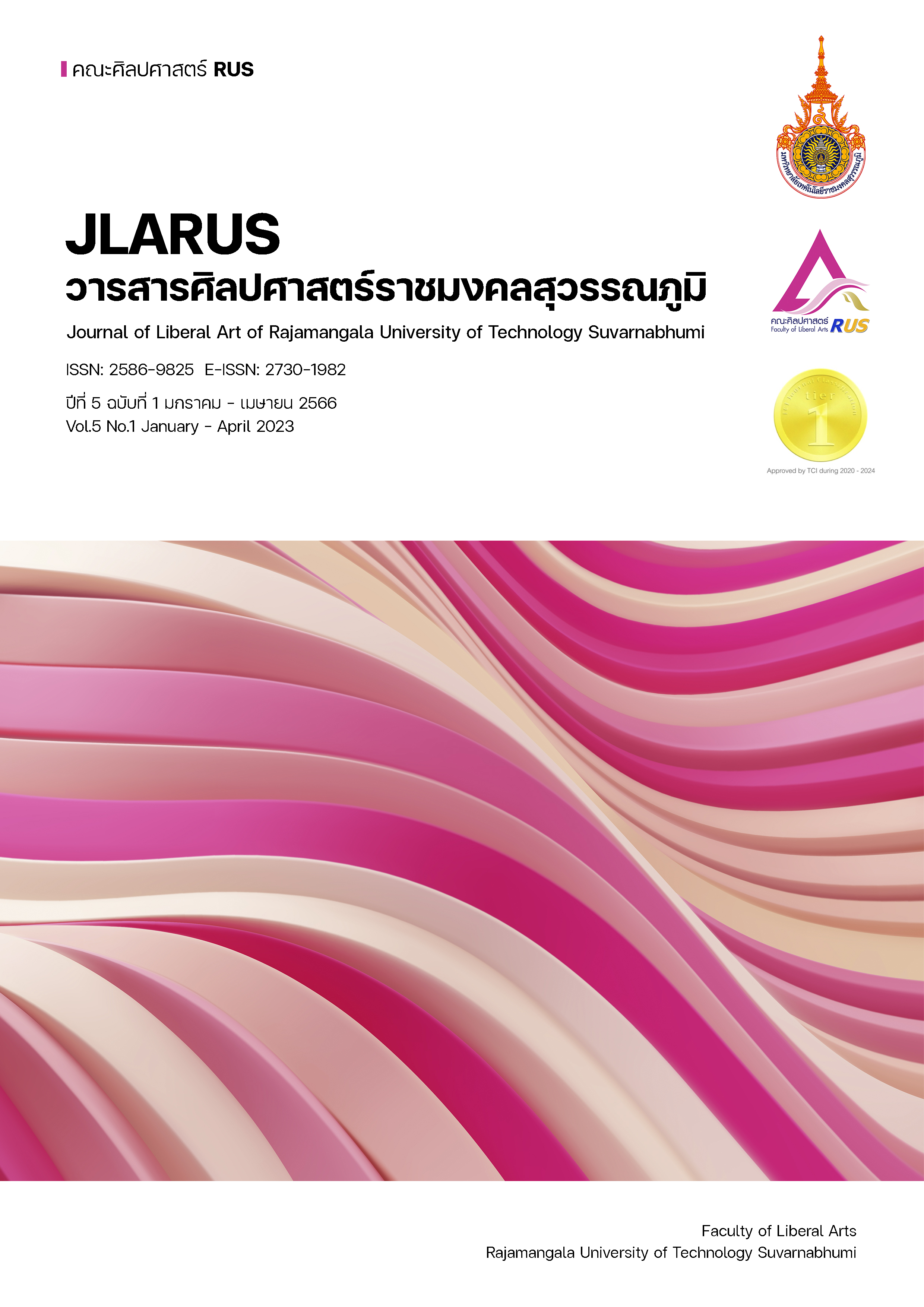HOW TO TEACH THE DUANWU FESTIVAL (DRAGON BOAT FESTIVAL)
Main Article Content
Abstract
The Dragon Boat festival (Duanwu), also known to Thais as the “Wai Ba Jang” Festival, is one of the traditional festivals that is of great importance to the Chinese people. Its legends and background are interesting, and the festival is also associated with climate and nature. The Tuan Wu Festival is held to commemorate many historical figures. The main traditions of this festival include the Dragon Boat Racing (赛龙舟), Rice dumpling eating (吃粽子), the use of the Ai Chao herb (艾草), and drinking Song Huang liquor (雄黄酒), each of which is based on the attitudes and beliefs of ancient Chinese. As learners of Chinese as a foreign language, students should learn about and
understand the important Chinese culture and festivals. Teachers can integrate knowledge about the Duan Wu Festival through Active Learning teaching methods, by allowing learners to study the knowledge in order to gather, analyze and present information about the Duan Wu Festival on their own. Practical Learning can be used to teach the methods, organize activities for students to participate in theatrical performances, make festive desserts, and immerse themselves in the culture of the Duan Wu Festival. Integrated teaching methods applied in the subjects appropriately and teaching methods using technology are convenient and fast. Learners learn directly from native speakers, and learning through video clips or media technology that incorporate knowledge about the Duan Wu Festival will help students understand the social conditions, way of life, and history of each era of China more completely.
Article Details

This work is licensed under a Creative Commons Attribution-NonCommercial-NoDerivatives 4.0 International License.
References
กัญภร เอี่ยมพญา และคณะ. (2564). การจัดการศึกษาในยุคโลกาภิวัตน์. วารสารครุศาสตร์ปริทรรศน์ฯ, 8(1), 352-360.
ก่อศักดิ์ ธรรมเจริญกิจ. (2563). พูดคุยเรื่องเทศกาลตวนอู่. นิตยสารท่องจีนไทย สองภาษารายเดือน, 2(107), 7-8.
ชัยวัฒน์ สุทธิรัตน์. (2553). การจัดการเรียนรู้แนวใหม่. นนทบุรี: บริษัท สหมิตรพริ้นติ้งแอนด์พับลิชซิ่งจากัด.
ไชน่ามีเดียกรุ๊ป. (2564). ชาวจีนและต่างชาติร่วมฉลองเทศกาลตวนอู่ ใบไผ่ห่อบ๊ะจ่างสร้างสะพานมิตรภาพ. สืบค้น 4 มกราคม 2566. จาก http://thai.cri.cn/20220604/af0ac381-7f59-d8cc-bf3e-f021fceb3c71.html/.
ทิศนา แขมมณี. (2557). ศาสตร์การสอน องค์ความรู้เพื่อการจัดกระบวนการเรียนรู้ที่มีประสิทธิภาพ. กรุงเทพมหานคร: จุฬาลงกรณ์มหาวิทยาลัย.
ไทยโรจน์ พวงมณี และคณะ. (2564). แนวทางการอนุรักษ์และพัฒนาศิลปวัฒนธรรมพื้นที่หมู่บ้านน้าพร อาเภอเชียงคาน จังหวัดเลย. วารสารศิลปกรรมศาสตร์ มหาวิทยาลัยขอนแก่น, 13(2), 175-176.
ถาวร สิกขโกศล. (2557). เทศกาลจีนและการเซ่นไหว้. กรุงเทพมหานคร: มติชน.
ไพบูลย์ สุขวิจิตร บาร์ วิลาสินี ดาราฉาย และสุทธิชา เพชรวีระ. (2564). การใช้การสอนแบบบูรณาการและการสอนร่วมกัน เพื่อเสริมสร้างความสามารถทางภาษาอังกฤษของนักศึกษาชั้นปีที่ 3 สาขาวิชาภาษาอังกฤษสื่อสารธุรกิจ คณะศิลปศาสตร์ มหาวิทยาลัยศรีปทุม. การประชุมวิชาการระดับชาติและนานาชาติ มหาวิทยาลัยศรีปทุม ออนไลน์ ครั้งที่ 16. (น. 1967-1976). กรุงเทพมหานคร: มหาวิทยาลัยศรีปทุม.
รัฐพร ศิริพันธุ์. (2561). แนวทางการเตรียมพร้อมและวิธีการเรียนสาหรับผู้เริ่มเรียนภาษาจีน. วารสารมหาวิทยาลัยนราธิวาสราชนครินทร์ สาขามนุษยศาสตร์และสังคมศาสตร์, 5(1), 103-112.
สยามรัฐออนไลน์. (2565). กิจกรรมหลากสีสันต้อนรับเทศกาลไหว้บ๊ะจ่าง. สืบค้น 5 มกราคม 2566. จาก https://siamrath.co.th/n/354764/.
สาคร สมเสริฐ. (2561). ทางแห่งการทางานอย่างมีความสุข. วารสารนักบริหาร, 38(1), 3-10.
สานักข่าวซินฮวา. (2565). โตรอนโตจัดแข่งประชันฝีพายเรือมังกร. สืบค้น 5 มกราคม 2566 จากhttps://www.xinhuathai.com/soc/289714_20220619/.
BBC news 中文. (2018). 端午特写:大江南北的粽子和背后的乡愁. สืบค้น 10 มกราคม 2566. จาก https://www.bbc.com/zhongwen/simp/chinese-news-44521199/.
Chinatalks. (2022). เทศกาลตวนอู่ ไหว้ขนมบ๊ะจ่าง. สืบค้น 5 มกราคม 2566 จาก https://shor turl.asia/xBo34/.
Gao Bingzhong. (2009). Introduction to Chinese folklore. Beijing university Press.
Lin Jifu. (2018). The Inheritance of Dragon Boat Festival’s Custom and the cultural Self – confidence of Chinese People. Journal of Chang Sha University (Social Sciences), 41(2), 17-23.
Wang Qiang. (2018). Legend of the Dragon Boat Festival. Culture Monthly Journal, 18(5), 28.
Xiao Chuanlong. (2018). Differences and protection of the customs of the Dragon Boat Festival Based on a comparative study of the Minjiang River and the lower reaches of the Huanghe River. Journal of West leather, 40(18), 117.
Zhang Jun. (2007). Mysterious Festivals and Customs: A Study of Traditional Festival Rituals and Taboos. Chinese, Peking: Guangxi people's Press.
Zhou Shiyu. (2018). Legend of the Dragon Boat Festival. Journal of Qian xian. 6(2018), 98-100.
植物说. (2021). 野生艾草长什么样子(形状特点及图片). สืบค้น 10 มกราคม 2566. จาก https://m.zhiwushuo.com/baike/378962021050537896.html/.
美酒网. (2020). 端午节雄黄酒应该怎么用?雄黄酒的功效与作用. สืบค้น 10 มกราคม 2566. จาก https://m.meijiu.com/zhishi/22417/.


